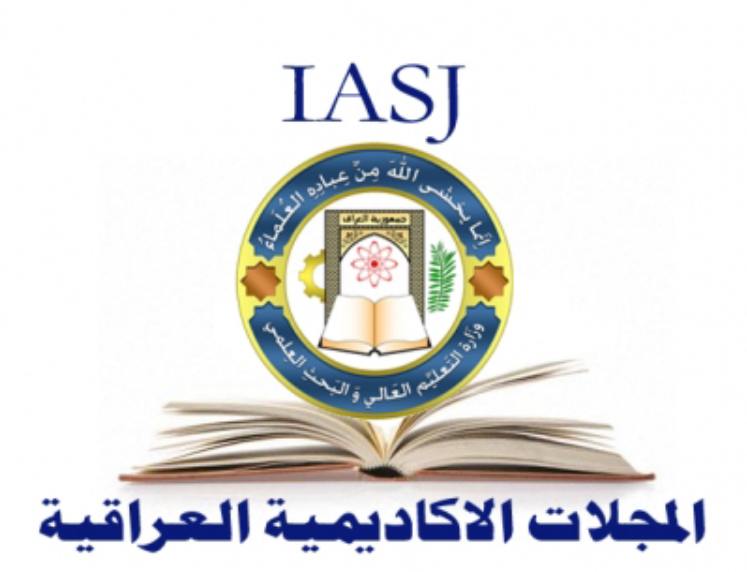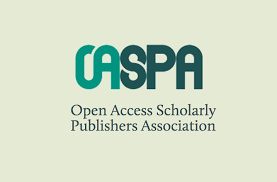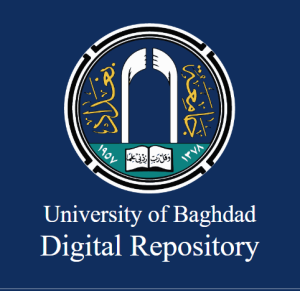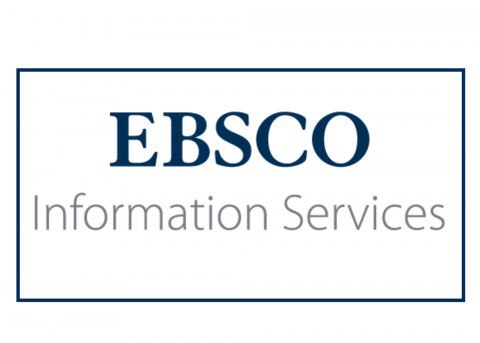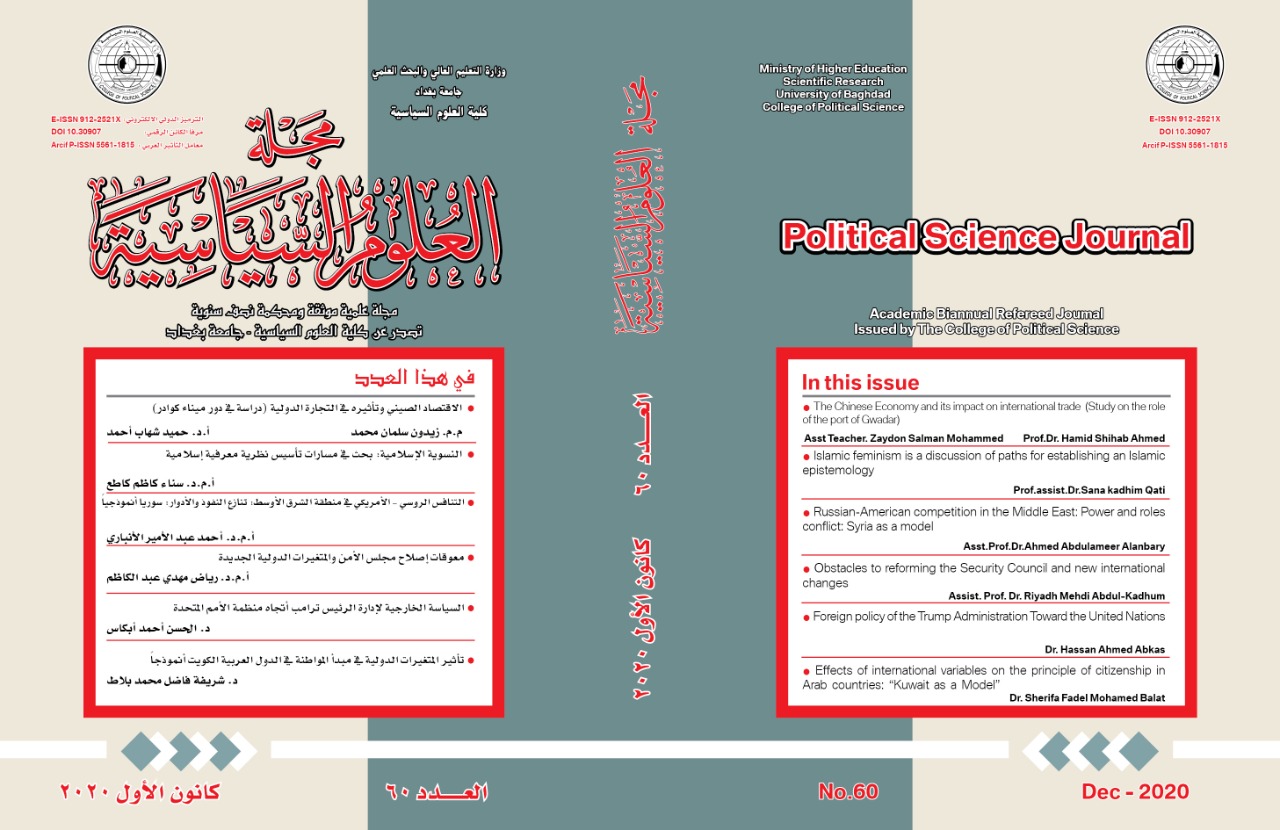دور مجلس الامن في ادارة الازمات الدولية (الازمة الليبية أنموذجا)
DOI:
https://doi.org/10.30907/jcopolicy.vi65.582الكلمات المفتاحية:
مجلس الأمن، الازمات الدولية، ليبياالملخص
يتمتع مجلس الامن بدور فاعل في معالجة الازمات الدولية والتعامل مع مسبباتها، وتعد الأزمة الليبية احدى اهم الاختبارات الحقيقية التي واجهتها من اجل تحقيق السلام والأمن العالميين، فلم يستطع مجلس الامن ممارسة دوره في معالجة المشكلة الليبية ومعطياتها، الامر الذي ساهم في استمرار الازمة وتفاقم تعقيداتها وتداعياتها الخطيرة، ولعل أبرزها تهديد السلام الذي تحقق بوقف القتال الذي تم بين مختلف الاطراف، والتي انتهت بتشكيل حكومة مؤقتة برئاسة عبدالحميد الدبيبة، وتنامي العقبات التي واجهتها وفي مقدمتها وجود التدخلات الخارجية والجماعات المسلحة، وعدم التوصل الى حلول جذرية وتوافقات مقبولة بين مختلف الاطراف الليبية، لرسم الخارطة السياسية المقبلة، ويؤكد فيها دعمه للمجلس الرئاسي والحكومة الانتقالية ويطالب بتوحيد المؤسسات الأمنية والعسكرية والتوافق فيما بين الفرقاء على اسس قانونية ودستورية للمرحلة المقبلة والتأكيد على قيام انتخابات شفافة وعادلة في توقيتاتها المحددة، فضلا عن تأكيده على تحقيق التوافق والمصالحة بين كل مكونات المجتمع الليبي، كما دعا مجلس الامن جميع الدول باحترام اتفاق السلام وانهاء التدخلات الخارجية في الشأن الليبي والقضاء على الجماعات المسلحة في اسرع وقت.
المراجع
قائمة المصادر:
ابو الفارة، يوسف احمد. 2009. إدارة الأزمات. الاردن: إثراء للنشر والتوزيع.
احمد، ناظم عبدالله. 2019. "دور المنظمات الدولية في تنمية مناطق ما بعد النزاع". أطروحة دكتوراه. جامعة كركوك/ كلية القانون والعلوم السياسية.
الامم المتحدة نت. 2022. "ميثاق الأمم المتحدة: النص الكامل". 2 نوفمبر، 2022
https://www.un.org/ar/about-us/un-charter/full-text
الامم المتحدة، مجلس الامن ، بعثة الامم المتحدة للدعم في ليبيا، تقرير الامين العام، رقم الوثيقة S/2021/62، متوفر على الرابط: https://unsmil.unmissions.org/sites/default/files/s_2021_62-ar.pdf
العلوي، الحسين. 2020. "الأزمة الليبية: بين صراع الإرادات الدولية والانقسام الداخلي". مركز الجزيرة للدراسات. 21 ديسمبر، 2016.https://studies.aljazeera.net/ar/article/4872
المجذوب، محمد. 2018. الوسيط في القانون الدولي العام. بيروت: منشورات الحلبي.
الزواوي، محمد سليمان. 2014. "التداعيات الإقليمية للأزمة الليبية رؤية تركية". مجلة رؤية تركية، مركز الدراسات السياسية والاقتصادية والاجتماعية، العدد 11 (أيلول): 24-36.
حسين، خليل. 2017. المنظمات العالمية: النظرية العامة الأمم المتحدة الأجهزة والوكالات والبرامج عصبة الأمم. لبنان: منشورات الحلبي الحقوقية.
حماد، كمال. 2003. "النمط الاستراتيجي الامريكي في إدارة الأزمات الدولية". مجلة الدفاع الوطني. العدد43. كانون الثاني، 2003.shorturl.at/FLW49
سشيفيس، كريستوفر وجيفري مارتيني. 2014. ليبيا بعد القذافي عبر وتداعيات للمستقبل. مركز سياسات الدفاع والأمن الدولي في مؤسسة راند الامريكية. 15 اذار، 2014.
https://www.rand.org/content/dam/rand/pubs/research_reports/RR500/RR577/RAND_RR577z1-1.arabic.pdf
عبد الكاظم، رياض مهدي.2020. "معوقات اصلاح مجلس الامن والمتغيرات الدولية الجديدة." مجلة العلوم السياسية، العدد. 60: 93-120.
منظمة العفو الدولية. 2022. "تقرير منظمة العفو الدولية لعام 2020/2021 حالة حقوق الإنسان في العالم". 7 أبريل، 2020. https://www.amnesty.org/ar/documents/pol10/4870/2022/ar
هيومن رايتس ووتش نت. 2021. "ليبيا احداث عام 2020". 13 يناير،2021.
https://www.hrw.org/ar/alshrq-alawst-wshmal-afryqya/lybya
:Lest of references
Abdul Kadhim, Riyad Mahdi. 2020. Obstacles to Security Council Reform and New International Variables. Political Sciences Journal, No. 60:93-120.
Abu Al-Farah, Youssef Ahmed. 2009. Crisis Management. Jordan: Ithraa for publishing and distribution.
Ahmed, Nazim Abdullah. 2019. “The Role of International Organizations in the Development of Post-Conflict Areas.” PhD dissertation. Kirkuk University/ College of Law and Political Science.
Alawi, Hussein. 2020. “The Libyan Crisis: Between the Struggle of International Wills and the Internal Division.” Al Jazeera Center for Studies. December 21, 2016. https://studies.aljazeera.net/ar/article/4872
Al-Zawawi, Muhammad Suleiman. 2014. “The Regional Implications of the Libyan Crisis, a Turkish View.” Turkish Vision Journal, Center for Political, Economic and Social Studies, No. 11 (September): 24-36. https://rouyaturkiyyah.com/file/%D8%A7%D9%84%D8%AA%D8%AF%D8%A7%D8%B9%D9%8A%D8%A7%D8%AA%20%D8%A7%D9%84%D8%A5%D9%82%D9%84%D9%8A%D9%85%D9%8A%D8%A9%20%D9%84%D9%84%D8%A3%D8%B2%D9%85%D8%A9%20%D8%A7%D9%84%D9%84%D9%8A%D8%A8%D9%8A%D8%A9/104
Amnesty International. 2022. “Amnesty International Report 2020/2021 The State of the World’s Human Rights.” April 7, 2020. https://www.amnesty.org/ar/documents/pol10/4870/2022/ar
Deplano, Rossana . 2015.The Strategic Use of International Law by the United Nations Security Council An Empirical Study. Uk:Springe.
Dirsus, Marcel and Tim Eaton . 2019. "Instability in Libya: Assessing the regional impacts Nato allied command transformation". Vol.3. No.1: 2-21.https://www.act.nato.int/images/stories/media/doclibrary/open201901-instability-in-lybia.pdf
Engelbrekt, Kjell, Marcus Mohlin and Charlotte Wagnsson. 2013. "Why Libya? Security Council Resolution 1973 and the Politics of Justification"., The NATO Intervention in Libya, Lessons learned from the campaign. London: Area Studies, Politics & International Relations.
Erdag, Ramazan2017 ,. Libya in the Arab Spring From Revolution to Insecurity. :New York Palgrave macmillan.
Griffiths, Martin, and Terry O'Callaghan. 2008. . International Relations, The Key Concepts New York: Routledge. http://ycis.ac.in/CEGC%20Library/English/International%20relations%20-%20key%20concepts.pdf
Hammad, Kamal. 2003. “The American Strategic Pattern in International Crisis Management.” National Defense Journal. Issue 43. January 2003.shorturl.at/FLW49
Holst, A. Fredrik and Matin D. Fink. 2014. A legal view on NATOs campaign intervention in Libya Lessons learned from the campaign. New York: Routledge.
Houben, Marc. 2005. International Crisis Management, The approach of European states. New York: Routledge.
Human Rights Watch Net. 2021. “Libya Events in 2020.” January 13, 2021.https://www.hrw.org/ar/alshrq-alawst-wshmal-afryqya/lybya
Hussein, Khalil. 2017. Global Organizations: General Theory. United Nations Organs, Agencies, and Programs League of Nations. Lebanon: Al Halabi Human Rights Publications.
Kareem, Bestoyin. 2016. "The UN Security Council and the Crisis in Libya and Syria, NJIA". Vol. 42, Nos. 1 &2.https://www.researchgate.net/publication/343212630_The_UN_Security_Council_and_the_Crises_in_Libya_and_Syria#fullTextFileContent
Lacher, Wolfram. 2020. Libya's Fragmentation, Structure and Process in Violent Conflict. London: I. B. Tauris.
Lobban, Richard A. and Christopher H. Dalton. 2014. Libya, History and Revolution. USA: Praeger.https://books.google.iq/books?id=h2mEAwAAQBAJ&printsec=frontcover&hl=ar&source=gbs_ge_summary_r&cad=0#v=onepage&q&f=false
Luck, Edward C.Luck. 2007. UN Security Council. Practice and Promise. New York: Routledge Institutions.
Majzoub, Muhammad. 2018. The Mediator in Public International Law. Beirut: Al-Halabi Publications.
Mccormick, James M. 1978. "International crises: A Note on definition". The Western Political Quarterly, University of Utah. Vol.31 (Sep): 352-358. https://www.jstor.org/stable/447735
Molling, Christian. 2008. "Comprehensive approaches to international crisis management" . CSS Analyses in Security Policy 3, No. 42(October): 1-3.https://css.ethz.ch/content/dam/ethz/special-interest/gess/cis/center-for-securities-studies/pdfs/CSS-Analyses-42.pdf
Murdoch, James C. and Tood Sandler. 2002. "Civil wars and economic growth: A regional comparison". Defence and Peace Journal, Vol.13. 1-27.https://web.worldbank.org/archive/website01241/WEB/IMAGES/REGIONAL.PDF
Schiffis, Christopher and Jeffrey Martini. 2014. Libya After Gaddafi Through and Implications for the Future. Center for Defense and International Security Policy at the American Rand Corporation. March 15, 2014. https://www.rand.org/content/dam/rand/pubs/research_reports/RR500/RR577/RAND_RR577z1-1.arabic.pdf
United Nations Net. 2022. “The United Nations Charter: Full Text.” November 2, 2022. https://www.un.org/ar/about-us/un-charter/full-text
United Nations, Security Council, United Nations Support Mission in Libya, Report of the Secretary-General, document number S/2021/62, available at: https://unsmil.unmissions.org/sites/default/files/s_2021_62-ar.pdf
Vandewalle, Dirk. 2012. A history of modern Libya. UK: Cambridge University Press.https://www.cambridge.org/core/books/history-of-modern-libya/83CEF8FC8ED364E5946C40A3AC54E008
التنزيلات
منشور
إصدار
القسم
الرخصة
الحقوق الفكرية (c) 2023 مجلة العلوم السياسية

هذا العمل مرخص بموجب Creative Commons Attribution 4.0 International License.





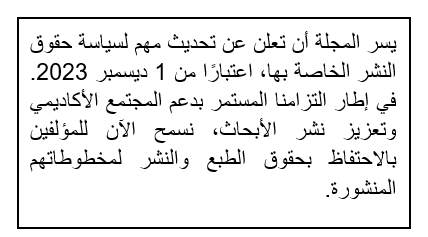
 ©️ 2023 The Author(s). Published by College of Political Science, University of Baghdad. This is an Open Access article distributed under the terms of the
©️ 2023 The Author(s). Published by College of Political Science, University of Baghdad. This is an Open Access article distributed under the terms of the 
